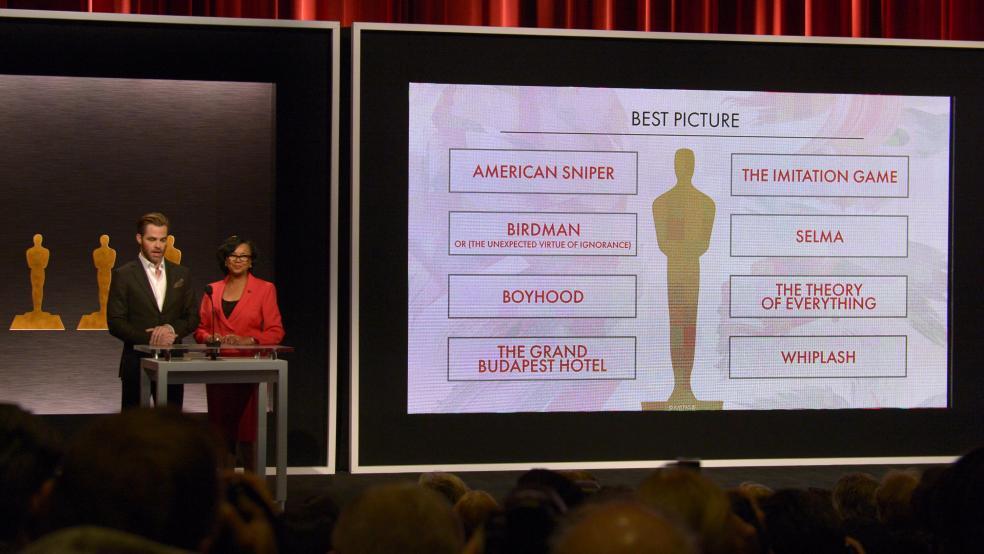For nearly as long as they’ve been around, the Oscars have come under fire for being too elitist. There are arguments on both sides of the issue, with one side saying that the Oscars are simply industry awards and should therefore reward the best performers, financially speaking, even if that means handing Michael Bay a trophy. The counter argument is that the awards are meant to reward exceptionally daring and innovative work. The truth is usually somewhere in the middle.
Not this year.
The crop of Best Picture nominees announced Wednesday all have one thing in common: None of them made much money.
Related: Oscars 2015: Are the Golden Globes a Crystal Ball?
Of the eight Best Picture nominees (and keep in mind, the Academy couldn’t even fill out all 10 slots this year, and only nominated nine movies last year), the highest charting film is The Grand Budapest Hotel, which was the 53rd highest grossing release of 2014 domestically. (See the full chart with the box offices results of the Best Picture nominees from the last five years below.)
By contrast, four of last year’s nominees made more money than that, with Gravity finishing in sixth place on the year. In recent years, the Best Picture nominees have included strong box office performers such as Lincoln, Django Unchained, Silver Linings Playbook, and The Help. In 2011, the No. 1 box office hit of the year, Toy Story 3, generated a staggering U.S. box office return of $415,004,880 — and garnered a Best Picture nomination.
As belts have tightened around Hollywood and box office returns have drastically decreased (at least domestically), there was pressure on the Academy to recognize more crowd-pleasing fare — to functionally do everything possible to put butts back in seats. The 2009 decision to increase the number of potential nominees to 10 was at least partially inspired by the desire to give more recognition to populist fare that might have missed out in previous eras. The awards in the 1980’s in particular became a kind of stately snoozefest (Out of Africa, Chariots of Fire) that turned the average viewer off. The English Patient’s 1996 win became a joke on Seinfeld for the way the Academy seemed to be awarding a film that was intentionally boring.
So what happened this year? Did Hollywood resume its snobbishness? Were the 52 films that outperformed Wes Anderson’s simply not worthy of a nomination? Or is it something else?
Related: Hollywood’s Desperate Measures to Save the 2015 Season
Guardians of the Galaxy, 2014’s top box office draw, was a totally loveable film but never likely to get Oscar recognition. The rest of the top 10 is a mixture of cartoons (both animated and of the Michael Bay variety), comic book movies and sequels. No. 15, Interstellar, certainly had the pedigree, even if it left viewers a bit cold. No. 17, Gone Girl, was widely expected to garner more nominations than it did —just the one for Rosamund Pike. No. 23, The Fault in Our Stars, had the Young Adult label to overcome, but was exceptionally well reviewed and loved by audiences.
Earlier in the week, The A.V. Club’s A.A. Dowd asked why Australian horror film The Babadook’s lead actress, Essie Davis, was never even in the running. The film has been almost universally praised, and her performance is the lynch pin that holds it together…but it’s a horror movie and Davis is a relatively unknown Australian actress, so there was simply no consideration of the possibility of a nomination. But if Davis turned in the best performance by a lead actress this year (and given the concerned talk about the dearth of roles in this category, it makes her exclusion all the more galling), then why wasn’t it considered?
The simple answer seems to be that Hollywood is circling its wagons, admitting defeat in the battle to get people back to the theater and consolidating what’s left of its rapidly dwindling power. The Golden Globes handed out to Julianne Moore and Amy Adams on Sunday are less a matter of recognizing their performances than awarding their existence. They are Movie Stars. You know them. They make good movies. They win Oscars.
Related: 10 Seismic Shifts That Changed Entertainment in 2014
The problem is that Hollywood does not seem to be churning out new Toms (Hanks or Cruise) or Julias. Last year’s ceremony generated a fair amount of hand-wringing about the lack of youth in attendance. Replace Emma Stone (who is surely an old soul) with Jennifer Lawrence and you have pretty much the same problem with this year’s nominees. It is telling that 38-year-old Benedict Cumberbatch is considered a hot young prospect.
So the Oscars will go on awarding the same old people until the sun sets on the Hollywood Empire. And while there is much (totally deserved) criticism of the lack of diversity in this year’s crop of nominees, the bigger question should be this: Why is Hollywood honoring work that is both mediocre and obscure?

Top Reads from The Fiscal Times:
- Playgrounds of the Very Rich and Famous—a 2015 Guide
- 15 Movies to Watch in 2015
- Quantifying the Power of Kim Kardashian’s Butt




